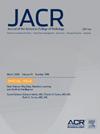Opinions and Preferences Regarding Artificial Intelligence Use in Health Care Delivery: Results From a National Multisite Survey of Breast Imaging Patients
IF 5.1
3区 医学
Q1 RADIOLOGY, NUCLEAR MEDICINE & MEDICAL IMAGING
引用次数: 0
Abstract
Objective
Artificial intelligence (AI) utilization is growing, but patient perceptions of AI are unclear. Our objective was to understand patient perceptions of AI through a multisite survey of breast imaging patients.
Methods
A 36-question survey was distributed to eight US practices (six academic, two nonacademic) from October 2023 through October 2024. This article analyzes a subset of questions from the survey addressing digital health literacy and attitudes toward AI in medicine and breast imaging specifically. Multivariable analysis compared responses by respondent demographics.
Results
A total of 3,532 surveys were collected (response rate: 69.9%, 3,532 of 5,053). Median respondent age was 55 years (interquartile range 20). Most respondents were White (73.0%, 2,579 of 3,532) and had completed college (77.3%, 2,732 of 3,532). Overall, respondents were undecided (range: 43.2%-50.8%) regarding questions about general perceptions of AI in health care. Respondents with higher electronic health literacy, more education, and younger age were significantly more likely to consider it useful to use AI for aiding medical tasks (all P < .001). In contrast, respondents with lower electronic health literacy and less education were significantly more likely to indicate it was a bad idea for AI to perform medical tasks (P < .001). Non-White patients were more likely to express concerns that AI will not work as well for some groups compared with others (P < .05). Overall, favorable opinions of AI use for medical tasks were associated with younger age, more education, and higher electronic health literacy.
Discussion
As AI is increasingly implemented into clinical workflows, it is important to educate patients and provide transparency to build patient understanding and trust.
关于在医疗保健服务中使用人工智能的意见和偏好:来自乳腺成像患者的全国多地点调查的结果。
目的:人工智能(AI)的使用正在增长,但患者对AI的看法尚不清楚。我们的目的是通过对乳房成像患者的多地点调查来了解患者对人工智能的看法。方法:从2023年10月至2024年10月,对8个美国实践(6个学术,2个非学术)进行了36个问题的调查。本文分析了调查中的一部分问题,具体解决了数字健康素养和对医学和乳房成像中人工智能的态度。多变量分析比较了受访者人口统计数据的回答。结果:共收集问卷3532份,回复率为69.9%(3532 /5053)。受访者年龄中位数为55岁(IQR 20)。大多数受访者为白人(73.0%,2579/3532),大学毕业(77.3%,2732/3532)。总体而言,受访者对人工智能在医疗保健领域的总体看法尚未确定(范围:43.2%-50.8%)。电子健康知识水平较高、受教育程度较高、年龄较小的受访者更有可能认为利用人工智能辅助医疗任务是有用的(所有p讨论:随着人工智能越来越多地应用于临床工作流程,教育患者并提供透明度以建立患者的理解和信任非常重要。
本文章由计算机程序翻译,如有差异,请以英文原文为准。
求助全文
约1分钟内获得全文
求助全文
来源期刊

Journal of the American College of Radiology
RADIOLOGY, NUCLEAR MEDICINE & MEDICAL IMAGING-
CiteScore
6.30
自引率
8.90%
发文量
312
审稿时长
34 days
期刊介绍:
The official journal of the American College of Radiology, JACR informs its readers of timely, pertinent, and important topics affecting the practice of diagnostic radiologists, interventional radiologists, medical physicists, and radiation oncologists. In so doing, JACR improves their practices and helps optimize their role in the health care system. By providing a forum for informative, well-written articles on health policy, clinical practice, practice management, data science, and education, JACR engages readers in a dialogue that ultimately benefits patient care.
 求助内容:
求助内容: 应助结果提醒方式:
应助结果提醒方式:


